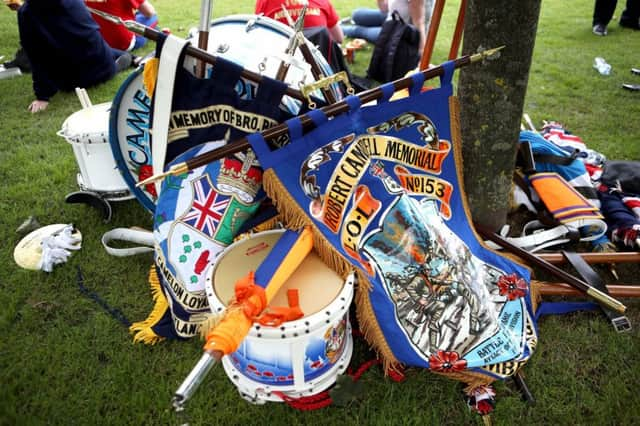Insight: Has Scottish politics given the Orange Order a boost?


At midnight on Tuesday night, the Belfast sky will turn orange as scores of giant bonfires are lit to mark the start of the traditional Twelfth of July celebrations. Then, on the day itself, half a million people, including a large contingent of Scots, will walk to the beat of lambeg drums as parades commemorating King William’s victory over James II and VII at the Battle of the Boyne are held in 18 towns across the Province.
The Orange Order walks – to some a celebration of Protestant culture, to others a flagrant anti-Catholic provocation – are a reminder that Northern Ireland’s decades of conflict are never far from the surface. Though the Good Friday Agreement and the setting up of the Parades Commission put an end to the large-scale civil disturbances that had become a fixture at flashpoints such as Drumcree, small-scale flare-ups persist.
Advertisement
Hide AdAdvertisement
Hide AdThis year, there have been fewer than usual; one of the most intractable disputes – centred on Ardoyne in Belfast – has finally been resolved. But the marches will take place against a backdrop of political upheaval provoked by Brexit and the collapse of the power-sharing agreement at Stormont.


The spectre of a hard border with Eire and the DUP/Tory alliance, which undermines the UK government’s role as an impartial broker, has put the peace deal at risk and left Northern Ireland in a state of uncertainty.
Developments at Westminster also mean this year’s celebrations are likely to be subjected to greater public scrutiny. With six out of 10 DUP MPs members of the Orange Order, there has already been an upsurge of interest in its activities.
So, were international news teams to descend en masse on Belfast tomorrow, would they witness much that would shame the politicians propping up the Conservative government? Last year, Glasgow-based Irish journalist Peter Geoghegan covered the city’s Twelfth of July celebrations for the first time, and was horrified by what he witnessed. “I was shocked by the level of hatred,” he says. “All the Catholics leave the city for the day and there are effigies of the Pope, signs saying: ‘Kill the Taigs’ and drunken teenagers singing: ‘Up to our knees in Fenian blood.’
“It does raise the question: if, once a year, you have an event which is entirely exclusionary, how can you ever build a shared and cohesive society?”


Meanwhile, Scotland – which has its own history of anti-Irish Catholic discrimination – is still dealing with the fallout from last weekend’s Glasgow parade. Around 4,000 people and 63 bands took part in the procession from George Square to Glasgow Green, with a further 4,000 turning up to watch.
Here the marching season is taking place against a different political canvas: the continued debate over independence and a general election which brought SNP losses and Conservative gains.
But the impact has been the same: it has magnified the Orange Order’s sense of its own importance (while simultaneously increasing the backlash against it) and put the marching season back in the spotlight.
Advertisement
Hide AdAdvertisement
Hide AdWhile many of its supporters – whose identity is closely bound up with Rangers FC – have faced humiliation as the club’s fortunes have declined, the institution appears to have been emboldened, by the “bloody nose” delivered to the SNP, by its putative role in the Tory resurgence and by the DUP’s new position of power.


Certainly some observers reported an increase in Union flags on lampposts (in defiance of Glasgow City Council’s prohibition) while a note of triumphalism crept into the speeches at Glasgow Green.
There was also – inevitably – some sectarian abuse. Though there were only eight arrests, footage of a band playing the music to the outlawed Famine Song – as onlookers belted out the words – led to a major online backlash and calls for future marches to be banned.
Though – somewhat ironically, given the DUP’s position on Brexit – the Orange Order’s right of assembly is enshrined in the ECHR, there is an enduring unease about the sheer number of marches and a belief, among many, that there is no place for displays of bigotry in modern day Scotland.
“The vast majority of Scottish citizenry are fed up with some of the behaviour that goes on at these events,” says historian Professor Sir Tom Devine.


For the past decade, the Orange Order has been waging a PR offensive in an attempt to address such hostility. It claims that, far from fomenting hatred, the institution exists to foster diversity and cultural tolerance.
Last week, Robert McLean, executive officer of the Grand Orange Lodge in Scotland, told the Call Kaye show the institution had worked hard to improve its own stewarding and its relationship with the police. He drew a clear distinction between Loyal Orange Lodge (LOL) members, the flute bands (which are hired out for the day) and “hangers on”. “If we found any Orange Order members were involved in singing a sectarian song, they would be disciplined,” he said.
One prominent defender of the Orange Order is writer and commentator Ruth Dudley Edwards; an atheist from a Catholic background, she spent time with those involved in an effort to understand its heritage and ethos, going on to write The Faithful Tribe.
Advertisement
Hide AdAdvertisement
Hide AdTwenty years on, she continues to believe the Orange Order is unfairly maligned and that the antipathy expressed by nationalists and journalists is disproportionate.
“I think everything gets inflated with the Orange Order. When you look at the coverage of the DUP deal in the English papers, it was quite over the top,” she says. “That cartoon of Arlene Foster [bedecked in Orange Order regalia] – she isn’t even in the Orange Order – and, as for the likes of Nigel Dodds, he probably goes once a year.
“The truth is the Orange Order is shrinking all the time. I think it would have gone out of business by now if it hadn’t been for all the confrontation.”
Dudley Edwards believes the attitude displayed towards members is similar to Hillary Clinton’s dubbing of Trump followers as “a basket of deplorables”.
“It is OK to be horrible about them because they are white and Christian – that’s the brutal truth. That was why so many of the liberati leaped upon them in the last few weeks – the way they have been talked about wouldn’t be considered acceptable with any other group in society.”
The problem with simply accepting the Orange Order’s view of itself, however, is that it fails to take into account the prejudice that is integral to its existence; even as it talks about the need for religious tolerance, it celebrates a Catholic defeat, forbids members to attend mass and retains a visceral distaste for the Pope.
“I come from a Catholic background and I grew up in Lisburn, which is a very loyalist town,” says Dave Scott, campaign manager with anti-sectarian charity Nil By Mouth. “So I played football and worked with people who were Orangemen. They were friends of mine until it came to the Drumcree stand-off and then I saw a side to them I hadn’t seen before. Suddenly, they saw me as an enemy and I got all sorts of stick.”
Equally, of course, the Orange Order is also the victim of sectarian attacks; last weekend, for example, Whiteinch Orange Hall was vandalised and its bins set on fire.
Advertisement
Hide AdAdvertisement
Hide Ad“While I think it has to take responsibility for some of the behaviour its marches can generate and feed, the Orange Order is sometimes on the receiving end of abuse and this creates a bunker mentality,” says Scott.
“There’s a psychological flaw in Orangeism. It’s always frightened of being betrayed; ‘Someone is going to let us down, so we must hold on to these positions we have.’”
On of the reasons the institution is constantly on the defensive is that, as a faith organisation, in an increasingly secular society, it faces an uphill battle for survival.
“Last year it held a charm offensive – Orangefest – in Glasgow, which was an attempt to help people understand what it stood for,” says Scott. “What was interesting was that only a couple of thousand people turned up because it was all Bible readings and lambeg drums.
“The Orange Order has a small active membership in Scotland and it’s the processions that get people out, not the prayer services. Without the parades, I think the Orange Order would cease to exist.”
Even in the context of the parades, supporters are not much interested in hymns, hence the bands’ tendency to play pop songs such as the Beatles’ Yellow Submarine and the Beach Boys’ Sloop John B (aka the Famine Song tune) neither of which have much to do with the Reformation, but keep people happy.
There is, therefore, a disingenuousness in the Orange Order’s attempts to separate their own members from the bands they hire and the onlookers their marches attract.
“The Loyal Orange Lodge is not responsible for the outbreaks of bad behaviour – the parades attract people who are also attracted to a certain football club – but it’s impossible to make a clear distinction between the two because the Order is based on anti-Catholic triumphalism,” says Devine.
Advertisement
Hide AdAdvertisement
Hide AdNonetheless, away from the binary world of Twitter, there are many, including Devine, who view Orangemen and women as deserving of pity rather than disdain.
“If you look at social media over the last few days there has been almost 100 per cent contempt, but they are poor souls really,” says Devine.
“Until recent years, their rationale was anti-Irish Catholic racism (based on the fact they emerged out of the sectarian conflicts in Ireland in the 1790s) but history has moved on.
“In Scotland, Irish Catholics now have occupational parity with their fellow Scots. They have become full Scottish citizens and are quite happy in their own skins. The target has gone, and all that’s left is media interest in an irrelevant organisation.”
Though no great fan, Ian Dunn, the editor of the Scottish Catholic Observer agrees that manufactured outrage is inflating the importance of marches and leading to the demonisation of people who could now be perceived as underdogs. “Historically Catholics in Scotland were seen as a bit undesirable and Presbyterian culture and Orange walks were part of that,” he says. “But now I think the shoe is on the other foot and the Orange Order is perceived as undesirable by the great and the good.”
“Sure, some of those involved in the parades are not very pleasant, but I think they are having a hard enough time with their football team – you don’t really have to stick the boot in. Some of the comments I saw last week were demeaning.”
Dunn also questions the significance we attach to overt displays of bigotry such as the singing of the Famine Song, or the footage that emerged last month of Rangers supporters in a pub singing “We Hate Roman Catholics” to the tune of Tiffany’s I Think We’re Alone Now (a scene uncannily similar to the one in T2 Trainspotting). Is it really evidence of deep-seated sectarianism, or merely an attempt to wind up a group of people it knows will take the bait?
“It seems to me there is something ironic or performative in such displays,” says Dunn.
Advertisement
Hide AdAdvertisement
Hide Ad“I suspect a lot of these guys will be married to and work with people from Catholic backgrounds, but after all the Rangers stuff over the past 10 years, there’s a frisson to be had from playing up to the bad boy image. It’s that whole ‘everybody hates us, we don’t care,’ thing.”
If there is a performative element to flagrant expressions of anti-Catholicism, then it cuts both ways, with some of those on the other side of the religious divide exploiting their outrage to boost their profile or bolster their own sense of cultural identity.
A similar symbiosis is at work in the way some Yessers bought into the idea that the Orange Order played a role in SNP losses.
“I think the stuff about the Orange Order driving the Tory resurgence is a lot more about nationalists than it is about unionists,” says Dunn. “It suits them to have a bogeyman. And you see the same happening on the other side; if you delve into the world of the hyper yoons, there’s tons of stuff linking the SNP with the IRA.”
Most contentiously, perhaps, Dunn says the Orange Order and associated bands serve a positive function, providing structure to young people in some of Scotland’s deprived communities and reminding the country of a past it would rather sweep under the carpet.
Tomorrow, however, as the bonfires are lit, the more negative aspects of the Twelfth of July celebrations will be difficult to ignore. Though there is no reason to suppose this year will be any worse than last, the talks to resolve the stalemate at Stormont have been put on hold until September when tensions will have eased: this annual hiatus is the price paid for the LOL’s repeated assertion of its right to assembly.
In Scotland too the tensions continue; yesterday it was Alloa’s turn to face disruption as 8,000 band members took part in the Central Scotland parade. Tomorrow, flights and ferries will be full of men with Loyalist tattoos heading for the Province.
Police Scotland is under continued pressure to arrest the men filmed singing the Famine Song, Glasgow City Council to reduce the number of marches and the Orange Order to take more responsibility for the behaviour of its followers.
Advertisement
Hide AdAdvertisement
Hide Ad“The parades are contentious because there are so many of them and they are paid for directly by the taxpayer,” says Scott.
“I think there needs to be a grown-up discussion – with everyone round the table – and that the Orange Order needs to take part. Yes, things have improved in the past few years but there’s still more that could be done.”